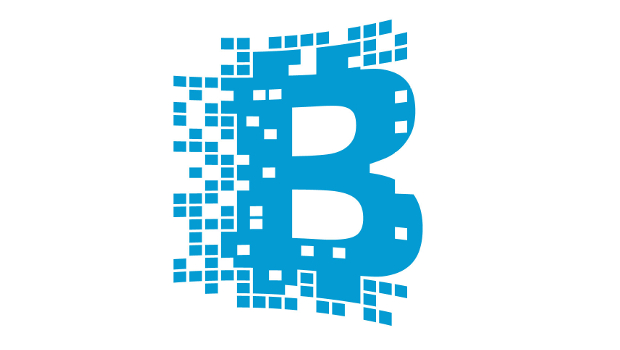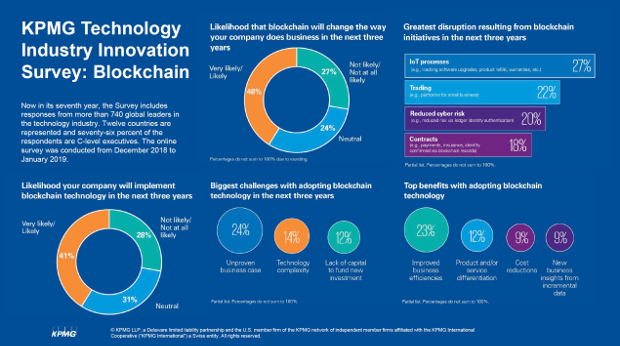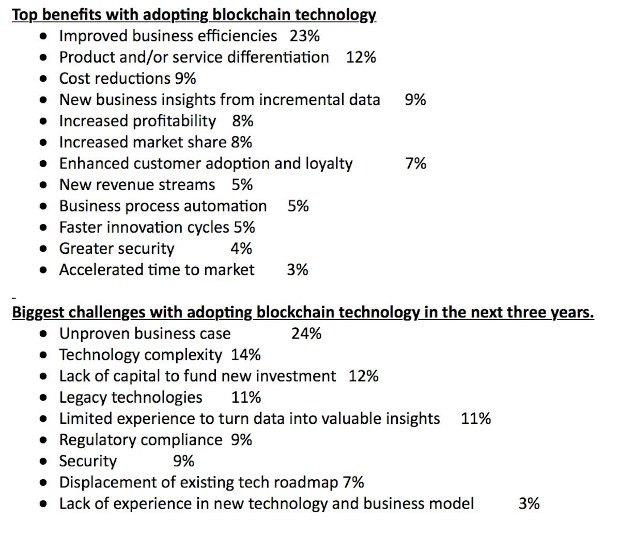
Half of C-level execs say blockchain will change how their tech firms do business
Nearly half of IT execs in a recent survey believe blockchain will change the way their companies do business over the next three years, and that the top benefit blockchain will enable is improved business efficiency.
Along with the 48% who indicate blockchain will likely change business practices, 41% percent of respondents to a KPMG survey said they’re “likely” or “very likely” to implement blockchain during the same timeframe.
“Based on the trajectory of blockchain in the marketplace and the number of clients in our portfolio who express an interest in implementing – not just learning about – blockchain, 41% is a surprisingly low number,” Tegan Keele, KPMG’s US Blockchain Program leader, said in a blog post.
One “leading global tech organisation” that KPMG helped deploy blockchain to track the shipment, lease lifecycle and financial management of employee laptops and tablets, now plans to scale the platform to other enterprise assets like servers, according to Keele.
“And, when one of the company’s suppliers heard about this use case, that organisation wanted to extend the solution to their own enterprise and supplier network, as well,” Keele said.
Interestingly enough, the IT executives surveyed believe the greatest disruption arising from blockchain adoption will be in IoT, where it’s expected to help track software upgrades, product refills and product warranties.

Twenty-three percent of respondents believe blockchain will disrupt IoT, compared with 22% who pointed to trading and 20% who believe it will reduce cyber risks in the next three years.
The online survey of technology firm clients was conducted in December and January; there were 740 respondents, 76% of whom were C-level executives, including CEOs, COOs, CFOs, CIOs and CTOs.
The companies surveyed worked in software; hardware/electronics; cloud; and internet software and services. Because the executives were from tech firms, their answers were skewed toward a willingness to experiment with new technologies, according to Keele.
“I think tech companies are inclined to experiment by virtue of their industry,” Keele said during an interview. “So I think IoT is something they’ve been thinking about and tinkering with. They’re probably thinking more broadly about what blockchain and IoT looks like, what blockchain plus A.I. and Machine learning look like.
“Generally, they’re asking us how we see those technologies converging more so than folks in other industries,” Keele said.

Blockchain, a type of database that runs on an open, peer-to-peer network, can automate business practices through technology known as “smart contracts” – self-executing code based on predetermined rules. For example, smart contract code can be used to automatically update software on IoT devices or, when used in supply chain management, verify that a cargo container has reached a port.
According to KPMG’s Tech Innovation Survey results, technology executives indicated the top benefit they associate with blockchain adoption is improved business efficiency (23%), compared to only 9% who were interested in cost reductions or deriving new business insights from data contained in the distributed ledger technology.
Referring to external data gleaned from business processes, such as supply chain management or parts procurement, Keele said: “Once that’s on blockchain, I can create an end-to-end view of that data…that gives me better insights into what’s happening both internally and externally.”
The biggest challenges likely to slow adoption of blockchain technology in the next three years, according to the survey responses, are unproven case studies (24%), technology complexity (14%) and a lack of capital to fund new investments (12%).
While there has been an increase in blockchain deployments over the past two years, virtually all of them have been proofs of concept or limited pilots, with actual production blockchain systems being a rarity. Additionally, blockchain coders are in high demand and short supply, and they can command salaries well north of six figures.
Nevertheless, blockchain use cases are beginning to mature and the rate at which production systems go online is expected to increase over the next three years.
“I think it’s a question of the maturity of blockchain and how even a few months ago we were still seeing a lot of experimentation mode,” Keele said. “What we’re seeing now is the filtering out of where blockchain actually makes sense. Those uses cases are maturing.”
IDG News Service







Subscribers 0
Fans 0
Followers 0
Followers